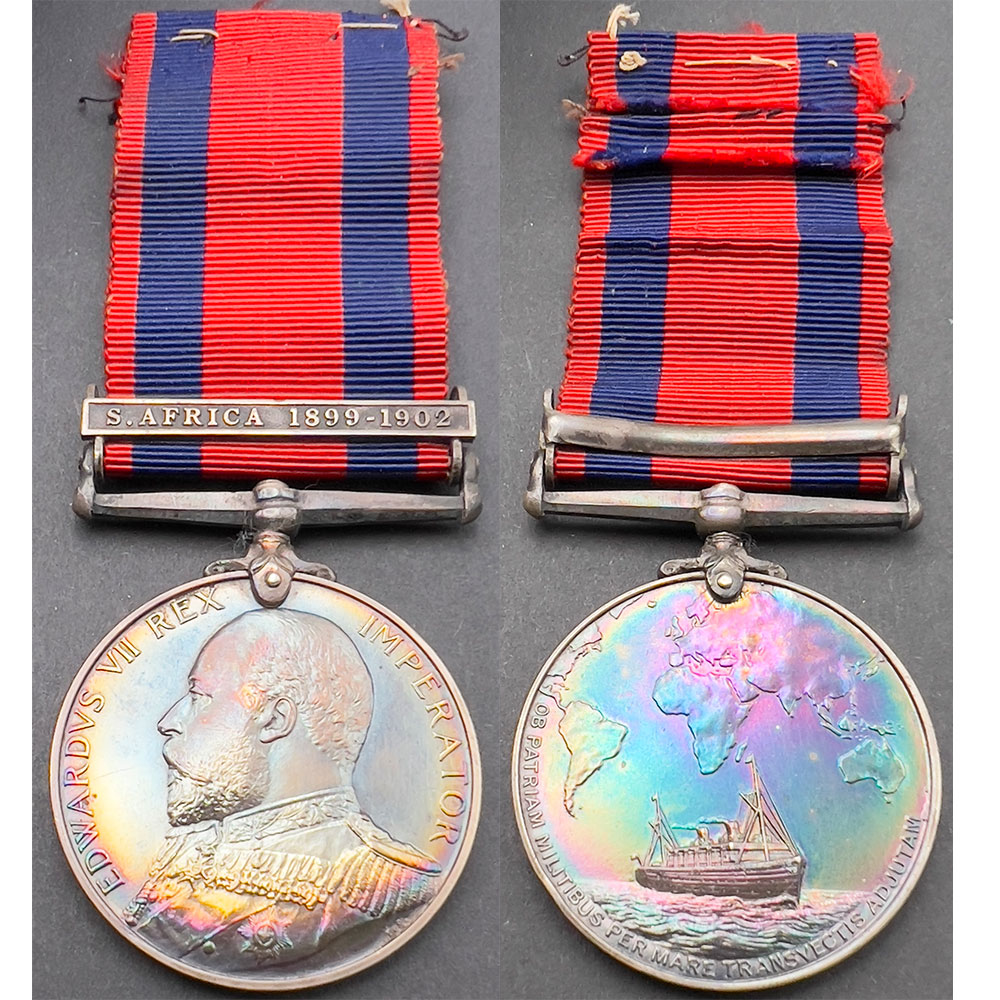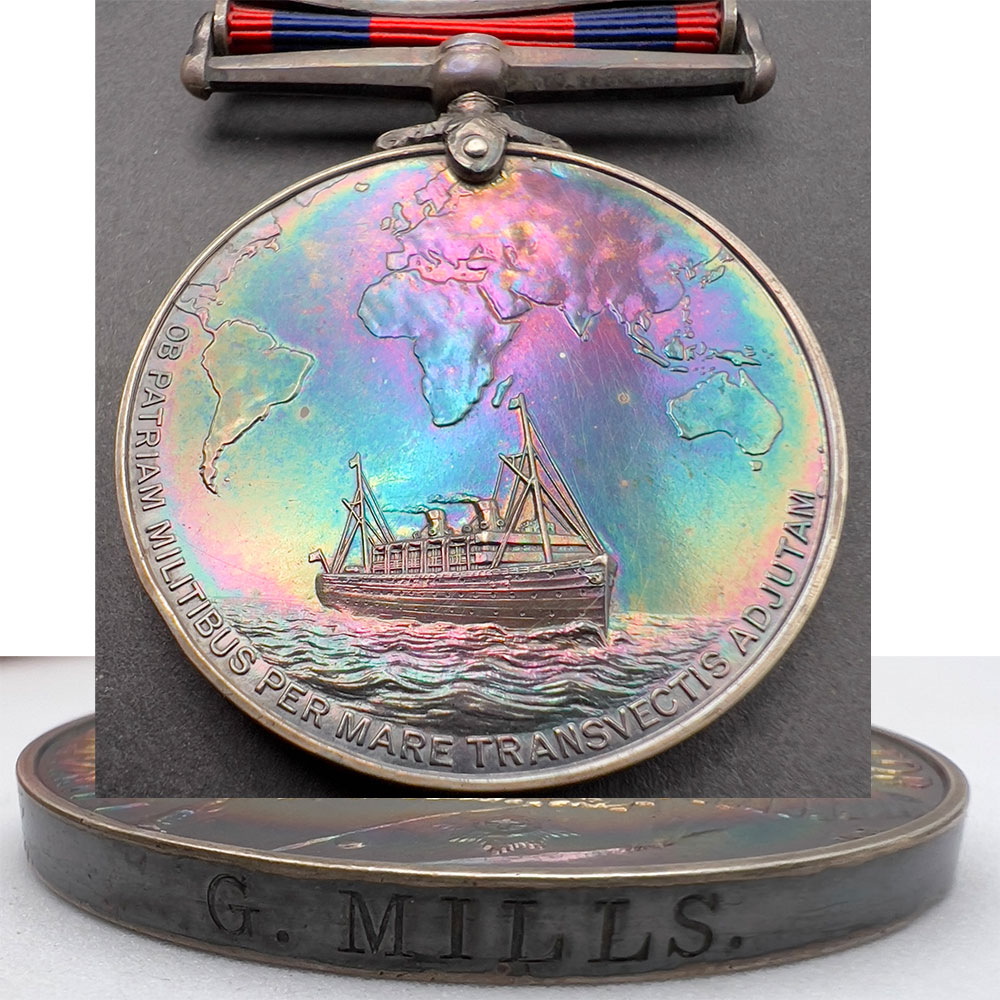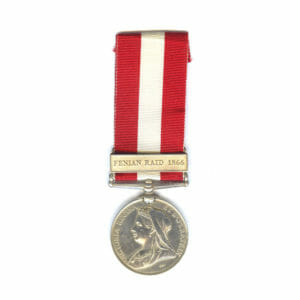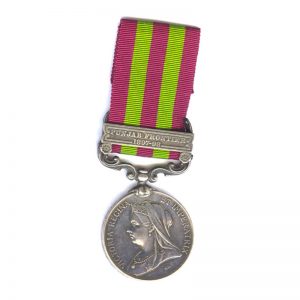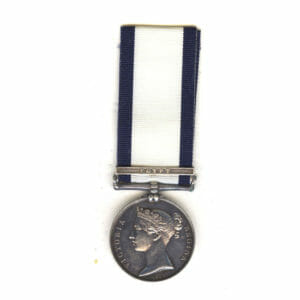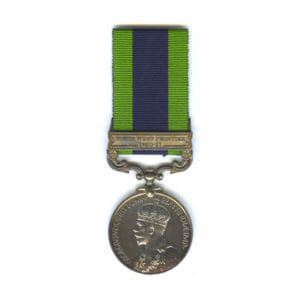Description
Transport Medal, bar S. Africa 1899-1902, G. Mills, 2nd Engineer of the Ship Dictator, who transported the troops to fight in the Boer War.
Officially Impressed: “G. Mills”
Confirmed on the medal roll as the 2nd Engineer of the S.S Dictator at the time of the war.
An excellent condition example of the medal, un-cleaned with an old colourful “Rainbow” silver toning. Also on an old piece of original silk ribbon.
The Dictator was a T&J Harrison Line ship built in 1891, with the Official Number 97890.
During the Boer War she was commanded by Master G. Jeffery.
This was one of 7 medals issued only to Officers who served on board this ship during the war.
On 22nd October 1899, she sailed for South Africa with the 1st Battalion Royal Scots, carrying 29 Officers and 1050 men.
“The Dictator sailed this afternoon for South Africa with 40 R.A. 2 Officers 110 men 2nd Lincolns, 5 Officers and 240 Men 1st Royal Irish, 2 Officers and 156 men 2nd Hampshire Regt and details. She will call at Queenstown to embark 1 Officer and 50 men 2nd Norfolk, 2 Officers and 110 men 2nd Gloucester, 2 Officers and 100 men 1st East Lancashire, and 1 Officer and 65 Men 2nd North Staffordshire Regiment.” – Westminster Gazette, 1st Feb 1900.
However one of the so called “Absent-minded beggars” of the East Lancs had a terrible time on the ship, and would write an amusing review, where he ended his letter back home to Lancashire with: “I can assure you we would rather be here than on board the Dictator, even if she was bringing us home. Several of our men have expressed the determination to remain in South Africa rather than embark again.”
The full letter published in the Northern Daily Telegraph on 26th March 1900 reads:
HOW THE EAST LANCASHIRES TRAVELLED TO SOUTH AFRICA
We have received an interesting letter from a correspondent, who signs himself “One of the Absent-Minded Beggars,” giving a few particulars “for the Burnleyites,” as to how the draft of the East Lancashire Regiment travelled to South Africa.
On the 3rd February, 1900, he says, the draft paraded at 6 a.m., and were marched across the Curragh Camp, which was covered with snow, to the Government sidings, and entrained for Queenstown.
Previous to their marching away not one word of farewell was said to the men by the officers of the regiment. The band of the regiment, which on the previous night had played the colours to the station, and was probably very tired, was most noticeable by its absence.
The draft, which consisted of 20 non-coms and men of the details of the 1st Battalion, and 60 non-coms. and men of the 3rd Battalion, on arrival at Queenstown embarked on the S.S. Dictator, which sailed about three p.m. the same day.
Whilst going through the Bay we had a lot of troops sick, as the majority of our draft was composed of Burnley and Blackburn lads, who had never been further than from Liverpool to Birkenhead on a steamer.
The food which the men received up to the time we arrived at Las Palmas, on the 9th, was passable; for the remainder of the voyage, which ended on the 23rd.
I must say that it had decidedly turned round the corner, and was therefore thrown away. Food (tinned), also round the corner, could be bought at famine prices on board,. As we arrived at Las Palmas at night, and left at 1.30 am next morning, I cannot say anything about the place.
On the 12th we passed the Dunnotar Castle conveying invalids homeward.
On the 13th, nothing in view. On the 14th we buried at sea an Artilleryman who had enlisted as a wheeler for twelve months. On the 19th we had sports on board. I am glad to say that several of the 1st and 2nd prizes fell to our lads, and at night we had a convert on board, which was rendered more enjoyable by tobacco, presented by the owners of the ship.
On the 27th we arrived in Table Bay, and remained at anchor until the following day, when we arrived alongside the jetty; but we were not allowed to land until the last inst., when we were marched to Greenpoint Camp, and from there we entrained on the following day for De Aar, where we arrived on the 6th inst., where we were ordered to where we are now—Naauwpoort—which place we expect to leave and get to work shortly.
This place is at present under martial law, and the orders are rather rigourous, but that we do not much mind, as here at east we are treated as a man should be in the matter of food.
I must certainly say that better food is not received by the troops at home than we receive here – fresh bread and meat daily, coffee and tea, and plenty of each.
I can assure you we would rather be here than on board the Dictator, even if she was bringing us home. Several of our men have expressed the determination to remain in South Africa rather than embark again.”
